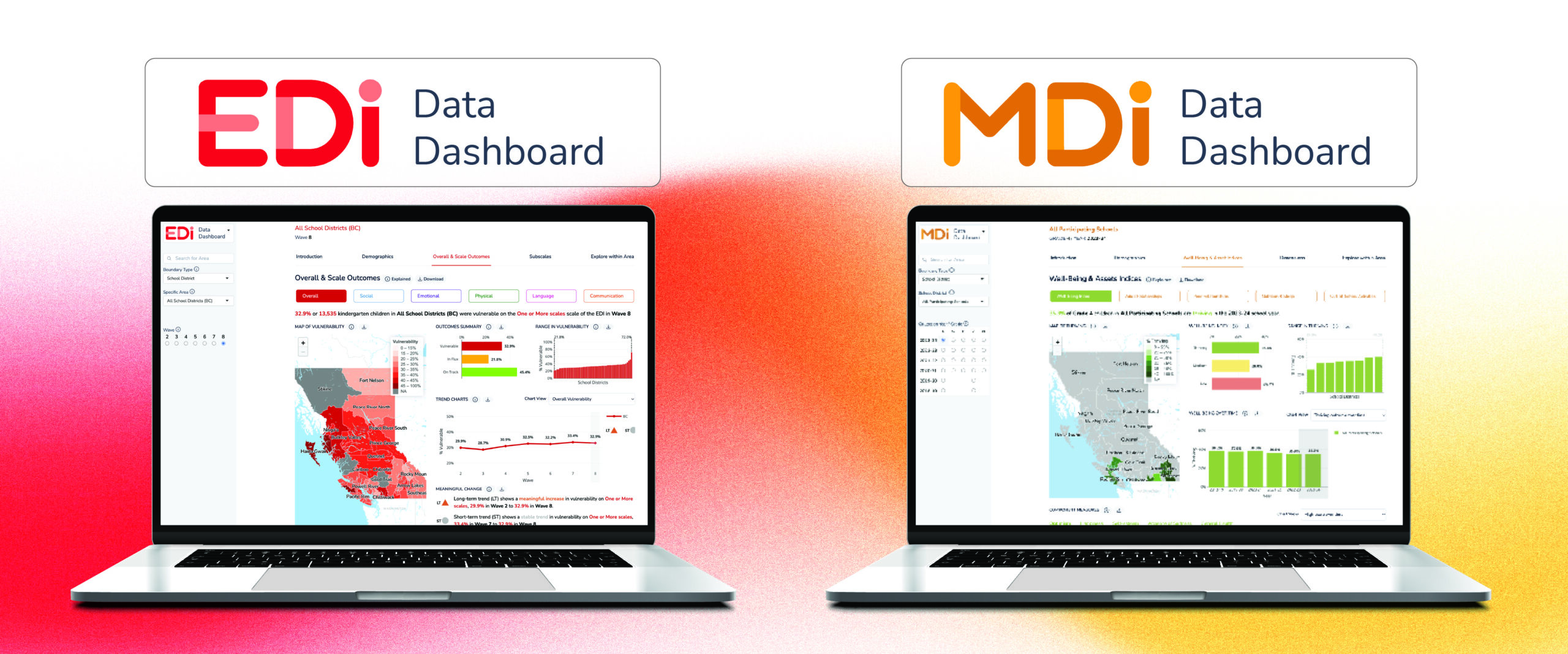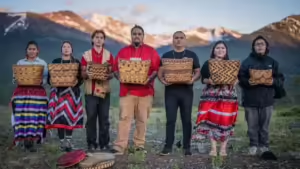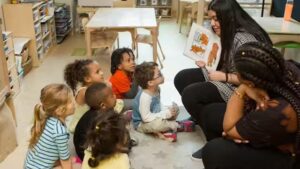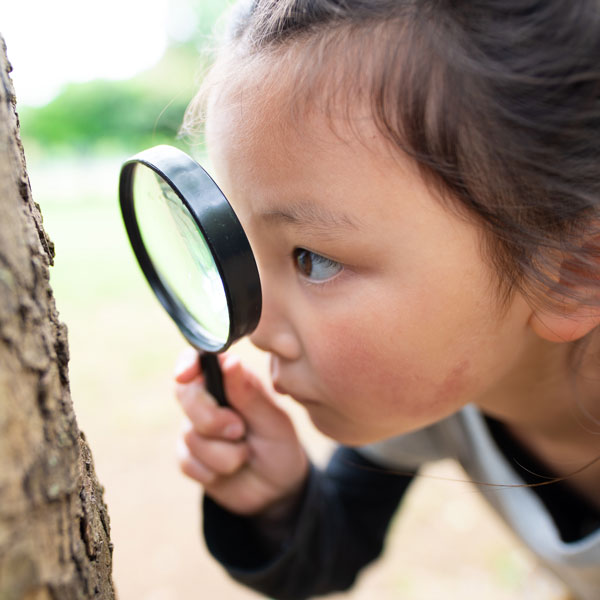The Human Early Learning Partnership is dedicated to improving the health and well-being of children through interdisciplinary research and mobilizing knowledge.
HELP in the Media
News and Events
-

Events
Children in the Middle Years: New MDI Data, Research & Resources
This National Child Day, HELP presents a webinar exploring MDI data collected in the 2024-25 school year, including trends in well-being, screens and sleep, as well as new questions on the student survey including mental health service use.
-

Events
Early Years Disrupted: EDI Data Trends
Join us for a webinar on November 3, focusing on the developmental health of kindergarten children in BC and beyond. Experts will present EDI data trends pre- and post-COVID-19 pandemic and related restrictions, and ongoing social and economic influences.
-

Indigenous
Reconciliation Through Institutional Training
In preparation for this upcoming National Day for Truth and Reconciliation on September 30, the National Centre for Truth and Reconciliation (NCTR) held a 3-part learning series on the history and ongoing effects of the residential school system, as well as possible future paths to move forward. Members of the HELP team were invited to participate and reflect on the series throughout the month.
-

Faculty
Dr. Daniel Bernstein Joins HELP as Affiliate Faculty Member
After receiving his PhD in Cognitive Psychology from Simon Fraser University, Dr. Bernstein completed his post-doctoral training at the University of Washington and now holds the position of Research Chair in Lifespan Cognition from Kwantlen Polytechnic University (KPU).
-

Data in Action
From Data to Action: Supporting Mental Health and Well-being in BC Schools
With wide-spread concern about declining trends in the mental health and well-being of youth over the last decade, our latest Data in Action story highlights the work of a dedicated team of experts helping school districts strengthen mental health promotion in BC schools.
Publications
-
RISKY PLAY
Children’s knowledge about play-related risk, risk-taking, and injury: A meta-study
Leisure/Loisir
McCallum, K. S., Youngblood, J., Hayden, K. A., Brussoni, M., Emery, C., & Bridel, W. (2023).Risk-taking in play has received increased focus in research over the last three decades through the use of quantitative, qualitative, and mixed methods. The purpose of this meta-study was to review the qualitative literature specifically to better understand how children (5–16 years of age) understand the concepts of risk, risky play, and injury in relation to their play experiences. Twenty-two studies were identified for inclusion in the meta-study.
-
SOCIAL-EMOTIONAL
Neural dynamics of development of nature empathy in children: An EEG/ERP study
ScienceDirect
Sahni, P.S., Rajyaguru, C., Narain, K., Miedenbauer, K. L., Kumar, J., Schonert-Reichl, K. A. (2024).This research paper explores the neurophysiological development of empathy for nature in children aged 5-12 using EEG/ERP methods. The study investigated neural responses to images depicting nature in distress versus no distress, revealing age-related shifts from affective arousal to cognitive appraisal. Findings suggest a correlation between increased frontal brain activity and higher dispositional empathy for nature.
-
EARLY YEARS
Understanding Educator Perceptions in Assessment of Kindergarten Children’s Development
Early Childhood Education Journal
Spadafora, N., Jezrawi, R., De Jesus, S., Cameron, D., Janus, M. (2024).Race-related data are not routinely collected as part of the Canadian kindergarten teacher reported Early Development Instrument (EDI) data collection even though they could be used to inform provision of supports for students and educators. Therefore, the goal of our exploratory study was to gather an understanding of teacher perceptions regarding the assessment of items on the EDI in the context of children’s race, gender, and family status and teacher positionality.
-
MENTAL HEALTH
Six-year (2016–2022) longitudinal patterns of mental health service utilization rates among children developmentally vulnerable in kindergarten and the COVID-19 pandemic disruption
PLOS Digital Health
Talarico, F., Metes, D., Wang, M., Hayward, J., Liu, Y.S., Tian, J., Zhang, Y., Greenshaw, A.J., Gaskin, A., Janus, M., Cao, B. (2024).In the context of the COVID-19 pandemic, it becomes important to comprehend service utilization patterns and evaluate disparities in mental health-related service access among children. This study uses administrative health records to investigate the association between early developmental vulnerability and healthcare utilization among children in Alberta, Canada from 2016 to 2022.
-
SOCIO-ECONOMIC
Childhood poverty, social support, immigration background and adolescent health and life satisfaction: A population-based longitudinal study
Journal of Adolescence
Gill, R., Karim, M. E., Puyat, J. H., Guhn, M., Petteni, M. G., Oberle, E., Janus, M., Georgiades, K., & Gadermann, A. M. (2024).This study examined whether poverty (neighborhood and household) was associated with future health or life satisfaction outcomes and whether the association operated through social support (adult support at home, adult support at school, peer belonging), or differed by the immigration background (nonimmigrant family or immigrant family) of the family. This study utilized a retrospective, longitudinal, population-based cohort that included self-reported survey data from the MDI.
HELP's unique approach
Relationships
Reciprocity, accountability and respect are at the foundation of HELP’s longstanding relationships with communities, organizations, institutions and governments across BC and Canada. These relationships, along with guidance from an Aboriginal Steering Committee (ASC), contribute to our research, data and knowledge mobilization initiatives. Learn more about the Aboriginal Steering Committee.
Data
The Child Development Monitoring System safely and reliably gathers population-level data about the developmental health and well-being of children and adolescents at multiple times between infancy and 18 years of age. It is the foundation for much of the leading-edge research and knowledge mobilization undertaken at HELP. Learn more about the Child Development Monitoring System.
Expertise
Faculty, researchers and affiliates at HELP hold scientific expertise across a wide range of disciplines, contributing to a unique and diverse program of research that situates HELP research at the forefront of important health and equity issues. Learn more about HELP research.
Impact
HELP leads collaborative and inclusive processes that transform data and research into action. Across both practice and policy, HELP is focused on supporting evidence-informed change across systems, institutions and in communities. Learn more about HELP’s knowledge mobilization and research impact.
Indigenous Initiatives at HELP













